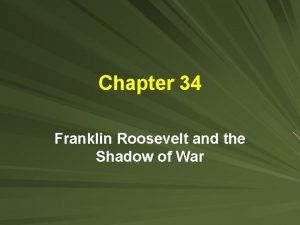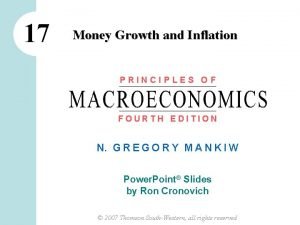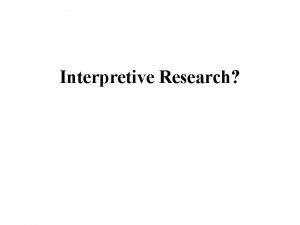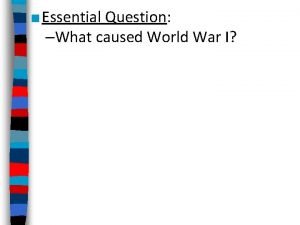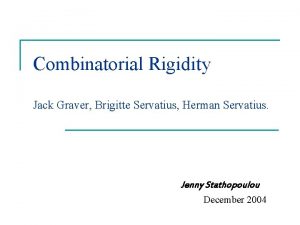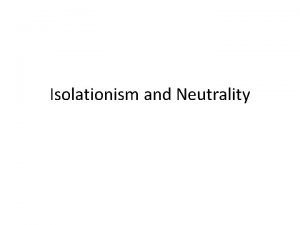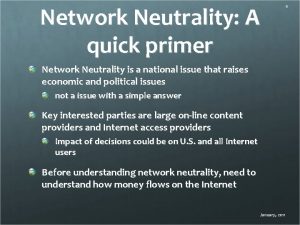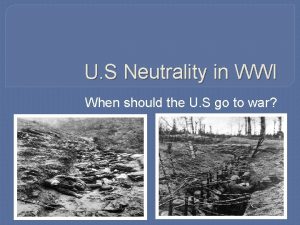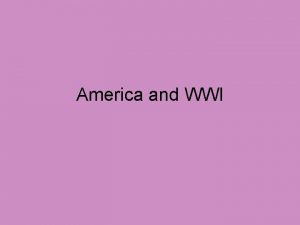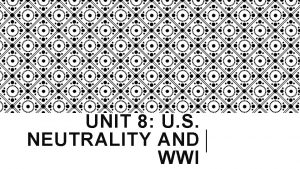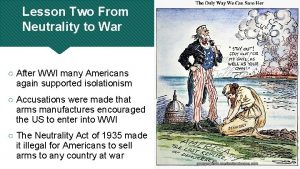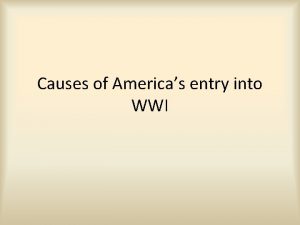WWI Neutrality Neutrality is at times a graver
















- Slides: 16

WWI Neutrality

“Neutrality is at times a graver sin than belligerence. ” Justice, 1856 -1941) --Louis D. Brandeis (American Supreme Court “If you are neutral in situations of injustice, you have chosen the side of the oppressor. If an elephant has its foot on the tail of a mouse and you say that you are neutral, the mouse will not appreciate your neutrality. ” Novelist, b. 1931) --Bishop Desmond Tutu (African Spiritual leader and (1)What does the term “neutrality” mean? (2)What do these quotes suggest about “being neutral? ” (3)Do you agree or disagree with these quotes about neutrality? Why?

AIM: Is neutrality possible in an era of global conflict? Key Terms: Neutrality Woodrow Wilson Submarine technology Zimmerman Note Central Powers Alfred Zimmermann Lusitania Blockades Sussex Pledge WW 1 Allied vs. Propaganda Essential Questions: (1)What were the advantages to the U. S. remaining neutral? (2)Which events/issues made neutrality difficult? (3)How did the United States’ imperial endeavors set us up for war? (preparedness, interest in keeping power, commercial interests? )

Triple Entente/Allied Powers • United Kingdom, France, Belgium, Serbia, Montenegro, & Russian Empire • Japan joins (1914)…and then so does Italy! (1915) • U. S. joined in 1917…after policy of neutrality had been abandoned. Triple Alliance/Central Powers • Germany and Austria-Hungary [and Italy @ the start] • The Ottoman Empire later joins (1914), along with Bulgaria (1915)


Remember M-A-N-I-A? ! Factors that caused WW 1: • Militarism – countries ready to fight in a moment’s notice; countries building up an army & weapons. • Alliance – a system of secret treaties had developed among the nations of Europe; the treaties bound the great powers to come to each other’s aid in the event of an attack. • Nationalism – loyalty, love and devotion to a nation by promoting its culture and interests. • Imperialism – the policy or practice of extending the power and dominion of one nation by direct territorial acquisitions or by indirect control over the political or economic life of other areas. • Assassination – Serbian nationalists killed the Archduke of Austria – Hungary.

World War I was the first total war. Once the war began, the countries involved mobilized their entire populations and economic resources to achieve victory on the battlefield. The war began as a clash between two coalitions of European countries. The conflict eventually involved 32 countries, 28 of which supported the Allies. Some of these nations, however, did not participate in the actual fighting.

President Wilson Declaration of U. S. Neutrality, (August 19, 1914) “My fellow Americans: The effect of the war upon the United States will depend upon what American citizens say and do. The people of the United States are drawn from many nations, and chiefly from nations now at war. It is natural that some will wish one nation, others another, to win this great struggle. Such divisions among us might seriously stand in the way of carrying out our duty as the one great nation at peace, [the] one people holding it ready to play the role of impartial umpire. I therefore speak a solid word of warning to you against passionately taking sides. The United States must be neutral in fact as well as in name during these days that are to try men's souls. We must be impartial in thought as well as in action. ” Why does Wilson elect to remain neutral at the start of WW 1?

People of European Background in the United States 1910 (Total United States Population: 91, 972, 266) Country of Origin Germany Austria-Hungary Great Britain* Russia Italy Foreign-Born American Born with 1 or 2 Foreign-Born Parents 2, 501, 181 5, 781, 437 1, 670, 524 1, 031, 262 1, 219, 968 2, 011, 084 1, 732, 421 1, 020, 254 1, 343, 070 755, 290 *Excludes Ireland Total 8, 282, 618 2, 701, 786 3, 231, 052 2, 752, 675 2, 098, 360

Value of U. S. Merchandise Exports to Great Britain and Germany 1914 -1916 Year Britain 1914 $594 m. 1915 $912 m. 1916 $ 1887 m. Germany $345 m. $29 m. $ 2 m.

Sinking of the Lusitania Reasons to Enter War • The first major crisis challenging U. S. neutrality and peace was the torpedoing and sinking of a British passenger liner, the Lusitania, on May 7, 1915. • Of the 1, 195 passengers who drowned, 128 were American.

Sussex Incident, (March 24, 1916) • Torpedoing of a French cross-channel passenger steamer, the Sussex, by a German submarine, leaving 80 casualties, including two Americans wounded. • The attack prompted a U. S. threat to sever diplomatic relations. • The German government responded with the socalled Sussex pledge (May 4, 1916), agreeing to give adequate warning before sinking merchant and passenger ships and to provide for the safety of passengers and crew. • The pledge was upheld until February 1917, when unrestricted submarine warfare was resumed.

Sussex Pledge (May 4, 1916) “The German Government…notifies the Government of the United States that the German naval forces have received the following orders: In accordance with the general principles of visit and search and destruction of merchant vessels recognized by international law, such vessels, both within and without the area declared as naval war zone shall not be sunk without warning and without saving human lives, unless these ships attempt to escape or offer resistance. But neutrals cannot expect that Germany, forced for fight for existence, shall for the sake of neutral interest, restrict the use of an effective weapon if her enemy is permitted to continue to apply at will methods of warfare violating the rules on international law…” What are the implications of the Sussex Pledge? **The Sussex Pledge was violated by Germany’s decision to engage in unrestricted submarine warfare in 1917.

Submarine Warfare Unrestricted submarine warfare was first introduced in World War I in early 1915, when Germany declared the area around the British Isles a war zone, in which all merchant ships, including those from neutral countries, would be attacked by the German navy. Although Germany abandoned this strategy, heeding the protests of neutral nations, it resumed in 1917 based on the navy's opinion that unrestricted U-boat warfare against the British at sea could result in a German victory by the fall of 1917. On January 31, 1917, Chancellor Bethmann Hollweg went before the German Reichstag government and made the announcement that unrestricted submarine warfare would resume the next day, February 1. “The destructive designs of our opponents cannot be expressed more strongly. We have been challenged to fight to the end. We accept the challenge. We stake everything, and we shall be victorious. ”

Zimmerman Note “…we propose an alliance on the following basis with Mexico: That we shall make war together against the United States and together we shall make peace. We shall give general financial support, and it is understood that Mexico is to reconquer the lost territory in New Mexico, Texas, and Arizona. The rest of the details are left for your settlement. You are instructed to inform the President of Mexico of the above in greatest confidence as soon as it is certain that the United States will enter the war. ” Why would Germany instigate for Mexico to get involved? Is neutrality still an option for the U. S. ?

Reasons to Stay Neutrality Challenges • Diverse population in U. S. – prevent disunion. • Ties to other countries (choosing a side) could be severed. • Wilson would like to be an arbitrator. • Isolationist interests (at least on surface). Interest in World peace (League of Nations). (Washington’s precedent of neutrality) • Commerce/trade with all nations. • Keep world safe (peaceful) for democracy… • German’s unlimited submarine warfare. Civilians may die. • Propaganda (ex. Lusitania) • Zimmerman note: Germany trying to influence Mexico to aid them in our hemisphere, w/ the promise of U. S. territory back to Mexico. • U. S. was not entirely neutral – it did increase trade with Britain and decrease trade with Germany. • U. S. citizens on ships with munitions on them… • Lost products and money; could enter war and boost economic gains in places that needed supplies (both food/gear/munitions). • Moral policy - democracy must win!
 Richard graver
Richard graver Mat0022
Mat0022 Neutrality acts 1935-37
Neutrality acts 1935-37 Well defined
Well defined Money neutrality
Money neutrality Wilson neutrality
Wilson neutrality Money neutrality
Money neutrality Accounting framework
Accounting framework Empathic neutrality
Empathic neutrality Balkan nationalism
Balkan nationalism Net neutrality
Net neutrality Monetary intertemporal model
Monetary intertemporal model Were critics of wwi anti-american
Were critics of wwi anti-american Sides of wwi
Sides of wwi 4 causes of ww1
4 causes of ww1 Is great britain a country
Is great britain a country What caused wwi
What caused wwi


